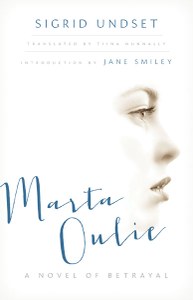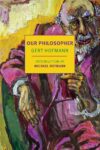 [University of Minnesota Press; 2014]
[University of Minnesota Press; 2014]
First published in 1907 Norway, Sigrid Undset’s slight novel narrates the fraught existence of a woman who commits adultery in an attempt to reclaim her sense of self. Tiina Nunnally’s intimate new English translation leaves space to feel the contrast between Marta’s unembellished journal entries and intricate grieving. The novel’s spare language becomes increasingly fitting as Marta’s husband and her hopes for relief from regret die. Marta Oulie provides a stark, yet personal addition to the conversations of early 20th century Western women writers such as Virginia Woolf and Kate Chopin.
Never moralizing or condemning, Undset depicts a woman who has been “reduced to nothing more than one of the entries in [her husband’s] thick catalog of blessings.” Marta writes in her journal to regain a voice that disappeared under her loving husband’s protective care. Otto Oulie is not mean; he loves Marta deeply, but she becomes “his own particular possession” nevertheless. In reviewing her life, Marta remembers the ski trips and the cottage surrounded by raspberry canes. Yet, even this happiness eventually wearies her. The fluid movement between flashbacks and current considerations gracefully depicts the layering of these memories. Time does not seem to move forward for Marta; instead, she sinks under its weight.
Much of Marta Oulie lingers on the mundane, sometimes to the point of being dull. But from this tedium stems torment. Marta writes, “I lived a life that was like balancing my way along a very, very narrow ledge. It was impossible to look in any direction but forward — otherwise I might grow dizzy and plunge over the side.” Yet, this balancing act is one of caution, not drama. Her story does not titillate its readers with near discoveries or awe them with vicious outbursts. Rather, it shows a woman who must still complete the normal tasks of a day, such as watching her children bake mud pies and listening to fellow teachers in the break room. In this ordinariness, Marta Oulie provides a particularly modern portrayal of women’s issues. This is the journal of a person, not a scandal for an audience.
After her husband’s death from consumption, Marta remarks, “I get annoyed whenever people try to be sympathetic, and annoyed when they don’t.” Undset’s novel seems to share its character’s frustration. It asks the reader to see and understand Marta, but not to harangue her for her wrongs or cry over her as a subject of sympathy. Marta always feels a bit distant, even as she confesses her sins and her lack of faith in the religion that names them as such.
Marta Oulie is a quiet book. It is not entrancing or lurid, as its subtitle, “A Novel of Betrayal,” suggests. Nevertheless, this 100-year-old novel draws on its reader to think about the ways we define ourselves as individuals, especially after entering partnership or parenthood. Ultimately, Marta Oulie does not focus on a wife betraying her husband, but on a woman betraying herself.
Emma Schneider is a graduate student at Tufts University; her research focuses on North American and Environmental Literature.
This post may contain affiliate links.







